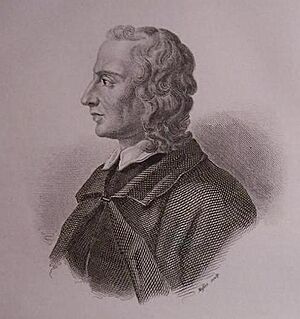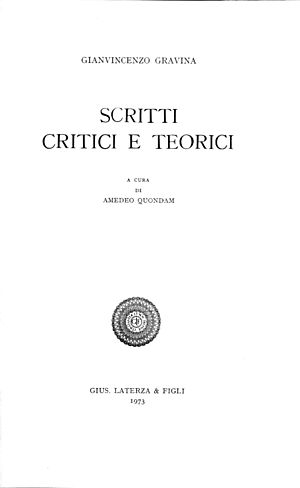Giovanni Vincenzo Gravina facts for kids
Quick facts for kids
Gian Vincenzo Gravina
|
|
|---|---|

Gian Vincenzo Gravina
|
|
| Born | 20 January 1664 Roggiano Gravina, Kingdom of Naples |
| Died | 6 January 1718 (aged 53) Rome, Papal States |
| Occupation | man of letters and jurist |
| Nationality | Italian |
| Period | 17th century |
| Notable works | Origines juris civilis De Romano imperio |
Giovanni Vincenzo Gravina (born January 20, 1664 – died January 6, 1718) was an important Italian writer and lawyer. He was born in Roggiano Gravina, a small town near Cosenza in Calabria. He is also known for being the adoptive father of the famous poet Metastasio.
Contents
Gravina's Early Life and Studies
Giovanni Vincenzo Gravina came from a wealthy family in Roggiano. When he was young, he went to study with his uncle, Gregorio Caloprese. His uncle was a respected poet and thinker. This time was very important for Gravina's education. His uncle taught him about classic writers and new ways of thinking. Caloprese had learned these "new science" ideas from Galileo, Descartes, and Pierre Gassendi in Naples.
Moving to Naples for Law
In 1680, Gravina moved to Naples to study law. He was very interested in the great thinkers and lawyers of the 1500s. At the same time, he became very good at Greek with his teacher Gregorio Messere. He quickly joined the most modern cultural groups in Naples. These groups were discussing new ideas in law and philosophy. Gravina's first published work, Hydra mistica (1691), was about morals and religion.
Life and Work in Rome
Gravina gained the support of Cardinal Antonio Pignatelli, who later became pope Innocent XII. In 1689, the Cardinal asked Gravina to come to Rome to work for him. Gravina brought new and lively ideas from Naples to Rome.
Founding the Academy of Arcadia
In 1690, Gravina helped start the Academy of Arcadia in Rome. This was a famous group of writers and thinkers. While in Rome, he wrote many works between 1692 and 1696. These writings were about literature, history, and art. Many of them were collected in his Opuscula, which he dedicated to Pope Innocent XII in 1696.
Becoming a University Professor
Gravina also received several public jobs. In 1699, he became the head of the Civil Law department at La Sapienza University. He helped to reorganize and improve the university, which had not been very active. In 1703, he moved to teach Canon Law. Pope Innocent XII offered Gravina important church positions, but Gravina did not want to become a priest, so he turned them down.
Important Legal Writings
Gravina was open to new ideas from all over Europe. This sometimes caused arguments with more traditional groups in Rome. In 1701, Gravina published the first version of his most important work, Originum juris civilis libri tres. He finished it in 1704, and the final version came out in 1708. This book was very popular across Europe. It became a key book for understanding the history of Roman law until the 1800s. It also explored how natural rights and historical laws are connected.
Literary and Aesthetic Works
Gravina's interest in literature, art theory, and history also led to many writings. His main works from this time include Ragion poetica (1708) and a collection of Orationes (1712). In 1711, a disagreement happened in the Academy of Arcadia. Gravina and his followers then started their own group called the Academy of Quirina.
Later Years and Legacy
From 1714 to 1716, Gravina rested in Calabria and took care of the property his uncle Caloprese left him. In his last years, Gravina kept writing about law and literature. He even wrote plays that were well-liked at the time. He also reconnected with friends in Naples, traveling there often and publishing more works. He passed away in Rome in 1718. His close friend and student, Pietro Metastasio, was with him when he died. Gravina left his property in Calabria to his mother and his Roman possessions to Metastasio. Some of his famous students included Lorenzo Gori and Orazio Filippo Bianchi.
Gravina's Main Works
Gravina wrote many scholarly works. His most important ones are Origines juris civilis, finished in three volumes in 1713, and De Romano imperio (1712).
His work on poetry, called Della Ragion Poetica libri due, was first published in 1708. In this book, he said that poetry is a way of understanding things through imagination and feelings. He believed poetry could inspire people to improve society. Gravina wanted to make poetry a science based on clear rules. He saw poetry as an early way of thinking, where philosophical truths are shared through images and emotions. He preferred older poets like Homer and Dante over more polished ones like Virgil and Torquato Tasso. His ideas hinted at Vico's famous book, The New Science (1725).
See also
- Lodovico Sergardi
- Manuel Martí
 | Misty Copeland |
 | Raven Wilkinson |
 | Debra Austin |
 | Aesha Ash |


